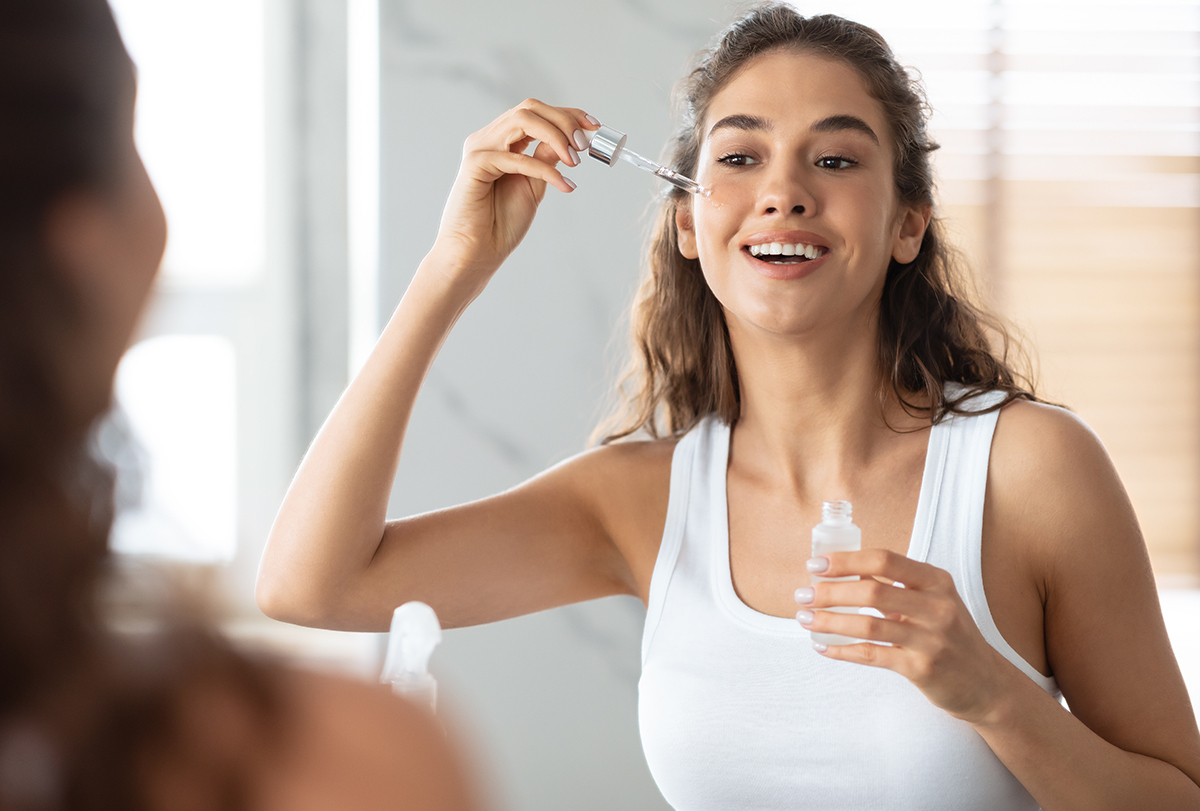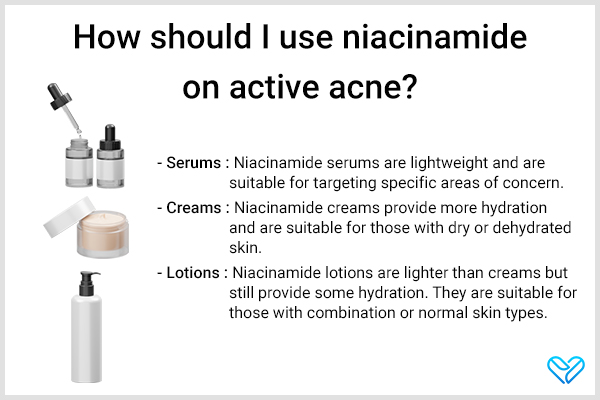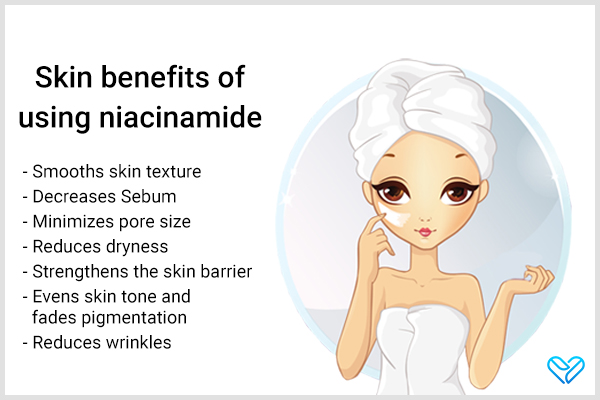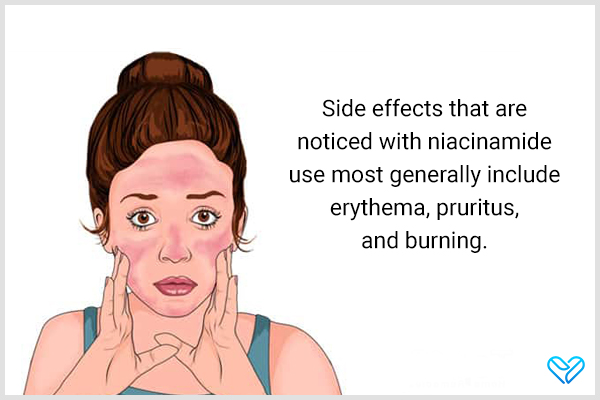In this article:
Niacinamide has gained popularity in skin care due to its numerous benefits for the skin. However, one common concern is whether niacinamide can be used on active acne.

The good news is that niacinamide is generally considered safe and effective for treating acne-prone skin, including active breakouts.
Continue reading to learn how to use this ingredient and more!
How Does Niacinamide Help in Active Acne?
One of the main factors contributing to breakouts is the overproduction of oil by the sebaceous glands on your face. This excessive oil can clog pores and lead to the formation of acne and blackheads.
Niacinamide has been found to have potential benefits for acne-prone skin.
A study showed that applying a topical solution containing 2% niacinamide can help reduce the amount of oil or sebum produced by the skin. By regulating the production of oil, niacinamide may help prevent and treat breakouts, especially in individuals with oily skin. (1)
Another study showed that topical 2% niacinamide significantly lowered sebum excretion rates after 2 and 4 weeks of use. Thus, it can be effective for acne by controlling excessive oil production. (2)
Moreover, niacinamide’s anti-inflammatory properties help reduce the redness, swelling, and irritation associated with acne.
In simpler terms, niacinamide can help control active acne by reducing the amount of oil on your face, which in turn can help prevent clogged pores and the formation of pimples. It can be a promising addition to your acne treatment routine.
What Is Niacinamide?
Niacinamide, also known as nicotinamide, is important in the maintenance of cell health and for fats and sugars to operate adequately in the body. It is part of the vitamin B complex and is a form of niacin (also called vitamin B3). (3)
Niacinamide’s popularity in skin care formulations is due to its lengthy inventory of potential advantages for skin health.
You can get niacinamide from your diet as well, not only from topical products. Foods high in niacinamide include eggs, milk, beans, fish, meat, peanuts, and green vegetables. (3)(4)
How Should Niacinamide Be Used on Active Acne?

Before using niacinamide, you have to know which formulation (serum, cream, or lotion) would be best suited for you. There isn’t a definitive “best” option as it depends on individual preferences and skin needs.
- Serums: Niacinamide serums are lightweight and are suitable for targeting specific areas of concern.
- Creams: Niacinamide creams provide more hydration and are suitable for those with dry skin.
- Lotions: Niacinamide lotions are lighter than creams but still provide some hydration. They are suitable for those with combination or normal skin types.
Here are the steps to using niacinamide for acne issues:
- Use a niacinamide product with a concentration of 2%–5%.
- Choose a suitable product/formulation (serum, cream, or lotion).
- Cleanse your face and pat it dry.
- Apply niacinamide to the areas with active acne. Use it in the morning and evening.
- If needed, moisturize your skin after applying niacinamide.
- Apply sunscreen with SPF 30 or higher in the morning to protect your skin.
How Long Does Niacinamide Take to Show Results in Acne Treatment?
One study showed that, after 8 weeks of treatment with 4% niacinamide gel, the results were comparable to those of 1% clindamycin gel in the treatment of acne vulgaris. Therefore, niacinamide gel is a useful option for the treatment of acne vulgaris. (5)
Skin Benefits of Using Niacinamide

Niacinamide offers the following skin care benefits:
1. Smoothens skin texture
Research has shown that products with 4%–5% niacinamide concentration stimulate substantial refinements in skin texture. They improve skin tone, evenness, and appearance by lightening the skin and, thus, have a flattering impact on skin texture. (3)(6)
2. Decreases sebum production
Niacinamide can help in reducing sebum production from the oil glands, making it suitable for oily skin. It helps in reducing acne by decreasing the sebum content. (2)
3. Minimizes pore size
Niacinamide can penetrate the skin’s epidermis quickly and exhibits a broad span of skin benefits. One of its many uses is it enormously lessens pore size and pore count, possibly by decreasing sebum production. (7)
4. Reduces dryness
Niacinamide moisturizers are useful in ameliorating dry skin and enhancing the stratum corneum or skin barrier function. However, how niacinamide functions at the molecular tier is not well understood.
A study found that dry skin regions managed with products containing niacinamide had lessened inflammatory action, reduced transepidermal water loss, and improved stratum corneum or skin thickness. (8)
5. Strengthens the skin barrier
The skin or stratum corneum lipids, especially ceramides, are significant elements of the epidermal or skin barrier, and they are reduced in conditions such as atopic dermatitis and aging skin.
Niacinamide thickens the skin barrier and raises the levels of ceramides and free fatty acids in the skin, enhancing its function and proficiency to preserve hydration. (9)
6. Evens skin tone and fades pigmentation
The B vitamins, such as vitamin B3 or niacinamide and panthenol, have been shown to decrease numerous indications of skin aging such as hyperpigmentation and redness.
In one study, everyday use of moisturizers containing niacinamide, panthenol, and tocopheryl acetate enhanced the skin tone and texture. A 4% niacinamide formulation can greatly enhance skin evenness and hyperpigmentation in merely 6 weeks. (5)
7. Reduces wrinkles
Niacinamide is useful in dealing with sallowness, wrinkling, red blotches, and hyperpigmented spots in aging skin.
In a study where the antiwrinkle impact of a cosmetic with niacinamide was evaluated, niacinamide yielded considerable improvements in fine lines and wrinkles. (10)
How to Use Niacinamide on the Skin
Topical niacinamide products may be useful additions to your skin care regime.
Studies have indicated that the skin benefits from topical formulations of niacinamide in concentrations between 2% and 5%. Several products go as high as a 10% concentration of niacinamide.
There is a broad span of niacinamide products to select from such as cleansers, moisturizers, creams, toners, and serums. You can use any of these according to your requirements.
However, the correct concentration and product type for you may rely upon your skin type, which you can discuss with your dermatologist.
What Are Some Side Effects of Niacinamide?

Side effects that are noticed with niacinamide use most generally include erythema, pruritus, and burning. However, they are only mild and diminish with everyday use as the skin adjusts to it. (11)
Most-Asked Questions
Can niacinamide be used during the day?
Yes, niacinamide can be a good component of your morning skin care regimen because of its proficiency in strengthening the skin barrier and protecting the skin from photodamage or sun damage. (3)
Is it safe to use both salicylic acid and niacinamide together?
For oily or acne-prone skin, you can use a combination of salicylic acid and niacinamide together. Experts claim that integrating both these products into your routine is considered safe and can greatly improve skin health. (12)
Can niacinamide be used with tretinoin?
Yes, niacinamide and tretinoin (retinoic acid) can be and are oftentimes employed together by professionals.
Can niacinamide be used every day?
Niacinamide is a good ingredient for everyday use and can even be used twice a day without an issue.
Can I apply niacinamide before makeup?
Yes, you can use niacinamide before applying makeup.
Final Word
Niacinamide can be very useful for your skin, especially if you have acne. Niacinamide can be used to improve acne vulgaris. However, consistent use is a must to see results.
- Was this article helpful?
- YES, THANKS!NOT REALLY


